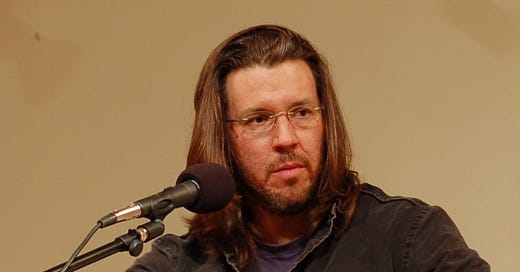David Foster Wallace's 2005 Kenyon College Commencement Speech
A poignant reflection on the reality of adult life, and arguably the best commencement speech I've ever heard
David Foster Wallace's 2005 Kenyon College commencement speech made the rounds a few years ago, never more intensely than after his death in 2008. As a guy in his early-50s who reflects on what he has and hasn't learned over the years, I find commencement speeches interesting and hopeful - little spoken placards of life wisdom by luminescent minds. I certainly didn't recognize any of this wisdom when I graduated from college, but am happy to recognize now, some 30+ years later. Better late than never, I guess.
Also let it be known that David Foster Wallace (or DFW, as the literary nerds denote him) is tops among my favorite authors. There are very few writers that ignite a passion for words and writing the way DFW does within me, and I find his writing invigorating, exciting, like a cold splash of water to the face on a hot day. It pulls me in immediately.

If you haven't read his Kenyon College speech, which he gave in 2005, the entire transcript is here. Please believe me when I say it's worth your time to read, and, if you're just a wee bit obsessive-compulsive like yours truly, print out several times and leave lying around your house in random locations, like ant traps against the daily boredom, frustration and stress of adulthood we all have to manage.
There's a bit of of this commencement speech that became slightly famous, a part in which DFW talks about what it means to be educated and what an educated mind chooses to think about. It seems banal - I can't imagine how it must have sounded to a gaggle of hopeful, jittering college grads - but as you get older and deal with life's many facets, DFW's words ring increasingly true. A portion of this famous bit is below:
And I submit that this is what the real, no bullshit value of your liberal arts education is supposed to be about: how to keep from going through your comfortable, prosperous, respectable adult life dead, unconscious, a slave to your head and to your natural default setting of being uniquely, completely, imperially alone day in and day out. That may sound like hyperbole, or abstract nonsense. Let's get concrete. The plain fact is that you graduating seniors do not yet have any clue what "day in day out" really means. There happen to be whole, large parts of adult American life that nobody talks about in commencement speeches. One such part involves boredom, routine and petty frustration. The parents and older folks here will know all too well what I'm talking about.
Of course, there's much more than that, but we'll get to it later, in a form more exciting than a river of words. But if you want the river of words (and honestly, read it at least once), it’s right here.
I always think about the point DFW makes (which you will understand better in just a bit), because I think every human has, by default, a selfish, myopic lens through which they view the world. It's the setting we have when we emerge from the womb - I'm hungry, I'm bored, that person is interfering with my lunch, these people need to hurry because I want to play - and it continues until something breaks its inertia.
That something, DFW posits, is education.
That something takes effort.
That something allows you to decide what to think, and what thoughts to abandon.
That something is the platform on which mindfulness, self-awareness, compassion and wisdom are built.
DFW committed suicide on September 12, 2008, and I remember it clearly. I remember it like I do the day when I learned Steve Jobs passed away. In the Keyon speech, DFW waxes on suicide a bit, and that part is especially painful to read given that he decided to take his own life three years after the speech.
This, like many clichés, so lame and unexciting on the surface, actually expresses a great and terrible truth. It is not the least bit coincidental that adults who commit suicide with firearms almost always shoot themselves in: the head. They shoot the terrible master. And the truth is that most of these suicides are actually dead long before they pull the trigger.
Learning what to think about and what to ignore is part of the game. DFW obviously couldn't ignore the things he should have, and he went down a dark and lonely road.
Keeping one's head straight is a daily struggle, and unless we're vigilant, entropy takes over and we find ourselves in bed one day at noon, wondering why the sun is so damn bright.
You have to override your default wiring. This point is timeless, and it's worth repeating in as many ways as possible.
As I promised, here's more of DFW's astonishing speech, in his own voice. Please watch. I hope you enjoy it as much as I do.
Thanks for reading!
If you found this post useful, please share - via social media, email, whatever suits you. I’d appreciate it.
If you haven’t become a subscriber to Pathfinding yet, please do. The free tier gets occasional posts, and the paid tier (only $5/month! cheap!) gets all posts and access to the archive as it accumulates. Either way, thanks for supporting this work.



